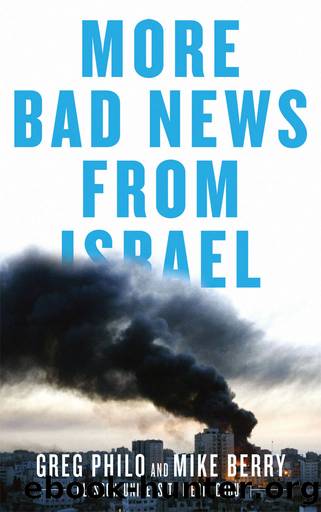More Bad News From Israel by Greg Philo Mike Berry

Author:Greg Philo, Mike Berry [Greg Philo, Mike Berry]
Language: eng
Format: epub
ISBN: 9780745329789
Barnesnoble:
Publisher: Pluto Press
Published: 2011-06-21T00:00:00+00:00
ADDITIONAL CONTENT SAMPLES: OCTOBERâDECEMBER 2001, MARCHâAPRIL 2002
Here, we analyse a series of additional content samples of TV news using the same methods as above. The purpose is to examine whether the trends which we have identified thus far are continued in later coverage. There were a number of specific areas of news content which we wished to identify and analyse for purposes of comparison with the earlier samples. These included news on the origins and history of the conflict, the reasons for the fighting, the rationales of the two sides, descriptions of motives and coverage of casualties. We chose these additional samples of news from periods where there was extensive media coverage of the conflict and analysed early evening and late bulletins from BBC1 and ITV. The sample dates from which the bulletins came were 17 October to 13 December 2001 (47 bulletins), 2â9 March 2002 (21 bulletins) and 9â16 April 2002 (30 bulletins). We also wished to identify any new themes or issues which had emerged in these periods. These later samples came after the events of the 9/11 attack on the US, which changed the international climate in which acts of violence and âterrorismâ were discussed. Within Israel, Ariel Sharon, the right-wing politician who had played such a role at the outset of the intifada, was now prime minister. There were also changes in the manner in which the Israeli-Palestinian conflict was fought. In 2001, the Israelis had begun a series of military incursions into areas which had been under local Palestinian administration, and some Palestinian groups were engaging in the extensive use of suicide bombs. The incursions were reported as involving attacks on refugee camps and the demolition of Palestinian homes as part of a new plan announced by Ariel Sharon to deal with the revolt against the Israeli occupation. As we have noted, this was a period of extensive settlement and military development in the occupied areas and it was reported that the Israeli army had âuprooted thousands of olive trees and vast tracts of farmland in Gazaâ (Guardian, 12 April 2001). In our analysis of news content above we noted the dominance of Israeli perspectives and how this in part reflected the success of their public relations output. In on-screen appearances/interviews, Israelis had twice as much coverage as Palestinians. To develop this analysis further in these samples, we analysed all reported statements as well as interviews. We counted all the coverage given to statements from each side and found that the Israeli dominance was sustained, notably in BBC coverage.17
In our first sample, we found that there was very little coverage of the history and origins of the conflict or discussion of the nature of the relationship between the two sides â that one was subject to military control by the other. The same was true of our later samples â we found nothing on the history and origins of the conflict. As before, there was extensive coverage of the violence and there was sympathy expressed for those caught up in it, but very little analysis of its nature and causes.
Download
This site does not store any files on its server. We only index and link to content provided by other sites. Please contact the content providers to delete copyright contents if any and email us, we'll remove relevant links or contents immediately.
| Direction & Production | Genres |
| Guides & Reviews | History & Criticism |
| Reference | Screenwriting |
| Shows |
Robin by Dave Itzkoff(2437)
Head of Drama by Sydney Newman(2297)
I'm Judging You by Luvvie Ajayi(2202)
The Paranormal 13 (13 free books featuring witches, vampires, werewolves, mermaids, psychics, Loki, time travel and more!) by unknow(2091)
Ten by Gretchen McNeil(1884)
Single State of Mind by Andi Dorfman(1809)
#MurderTrending by Gretchen McNeil(1656)
Key to the Sacred Pattern: The Untold Story of Rennes-le-Chateau by Henry Lincoln(1625)
Merv by Merv Griffin(1610)
Most Talkative by Andy Cohen(1588)
This Is Just My Face by Gabourey Sidibe(1468)
Notes from the Upside Down by Guy Adams(1467)
The Hunger Games: Official Illustrated Movie Companion by Egan Kate(1438)
Springfield Confidential by Mike Reiss(1412)
Binging with Babish by Andrew Rea(1411)
Jamie Oliver by Stafford Hildred(1387)
The TV Writer's Workbook: A Creative Approach To Television Scripts by Ellen Sandler(1347)
Clarkson--Look Who's Back by Gwen Russell(1342)
Blue Planet II by James Honeyborne & Mark Brownlow(1282)
